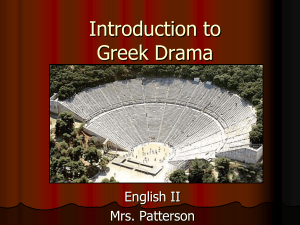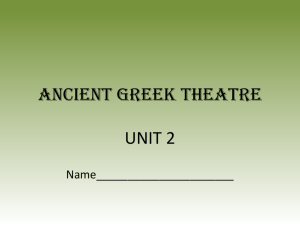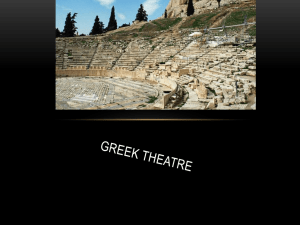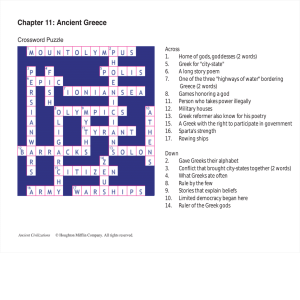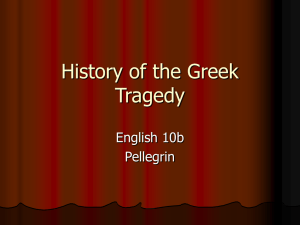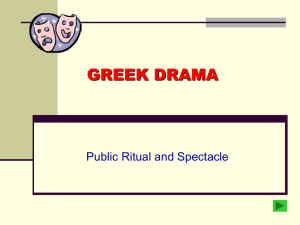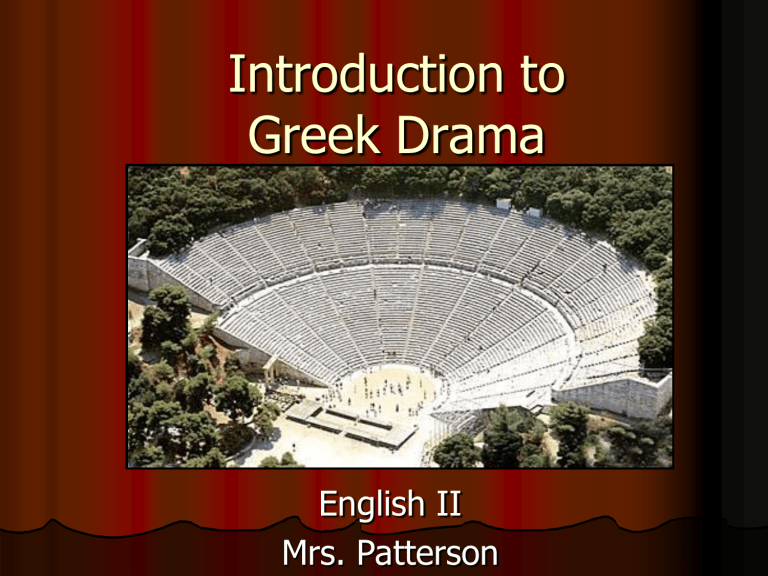
Introduction to Greek Drama English II Mrs. Patterson Origin of Drama Drama was developed by the ancient Greeks during celebrations honoring Dionysus. Dionysus is the god of the vine, which produces grapes for wine. Wine was associated with resurrection and suffering. With the inclusion of many choral songs, the early Greek plays resembled what we call opera today. Festival of Dionysus The Festival of Dionysus took place in Athens over the course of five days in March or April. During the first day, the Greeks held a procession honoring Dionysus in which all citizens participated. During the festival’s second day, the choral songs were performed. On the last three days of the festival, the actors performed three tragedies, one satyr (satire – mock heroic tragedies) play, and one comedy. Festival of Dionysus The archon, a state official, selected three poets to compete for the prizes in the tragedy division. The choregus, a wealthy, prominent citizen of Athens, was required by law to pay for the cost of training and costumes for the chorus. A jury of 10 citizens selected the winning poet The playwright served as a sort of teacher, offering plays for the ethical and moral improvement of his fellow citizens to insure the spiritual survival of the community. The Greek Theatre Theatron = area of seats for the audience hollowed out from the hillside Orchestra = large area in front of the stage where the chorus sang and danced Thymele = the altar centered in the orchestra used for sacrifices to Dionysus Parados = walled walkway used by the chorus to enter and exit the stage Pro-scenium = a long, low stage behind the orchestra Skene = building that contained the actors’ dressing rooms The Greek Theatre The Greek Theatre was similar to an outdoor stadium that could hold between 15,000 – 20,000 people. The Greek Theatre Greek Theater Greek Theater Greeks’ Special Effects There were no curtains, intermissions, lights, or microphones. Consequently, all scenes took place in daylight settings, all scene changes had to be built into the actor’s dialogue, and the chorus and actors had to have strong voices. Deus ex machina (meaning: “god from the machine”) = type of crane used for suspending figures who portrayed gods. Eccylema = moveable or revolving platform. Greeks’ Special Effects The Actors The Greek name for an actor was “hypocrite.” As there were only 3 actors, they wore masks to play multiple parts. All actors were men, because it was considered undignified for women to appear on stage Actors wore padded costumes, wigs, and high-heeled boots to make them taller and give them added dignity and power. Actors had to be able to speak in poetic language and sing using a loud and clear voice. The Chorus The chorus was led by a conductor and consisted of singers and dancers who moved and sang together, acting as one character. A Choral Ode was chanted or sung in unison. Originally, they Chorus started out with 50 people, but Sophocles fixed the number at 15. The Chorus The playwright used the chorus and their songs to: Add the beauty of song and dance. Set the mood or express the main themes of the play by commenting on the action. Create a bridge between the actors and the audience. Converse with and give advice to the actors. Tell about events that have already happened in the past. Foretell the future by interpreting the actions of the actors. The Stories Originally, the stories were hymns and prayers honoring the gods, especially Dionysus. Over time, the content of the stories changed to legends of Greek leaders and heroes. Tragedy In a tragedy, the plot revealed what happened to a person who went against the laws of the gods or who was too proud This stems from the Greek belief that man was subject to the whims of the gods and fate. The root of Greek tragedy is that man can not avoid suffering. In nearly all tragedies, man’s biggest fault is excessive pride – a mistaken belief that he could somehow avoid fate or the will of the gods. Greek Tragic Hero The Greek tragic hero had to be a man or woman capable of great suffering The tragic hero is brought to disaster by hamartia, or a single flaw in a person’s character. Hubris Hubris is defined as excessive pride. Hubris leaves leads to suffering and then to an understanding (catharsis) of man’s place in the system of life. Think of at least three modern examples of characters whose downfall is caused by their hubris. Catharsis is an emotional release caused by an intense emotional experience. The purpose of a Greek tragedy is to learn a lesson through the catastrophes that befall the characters on stage and to understand that their misfortunes are a result of not following the will of the Gods or trying to avoid their own destinies because of hubris. Structure of a Greek Tragedy 1. Prologue – the actors present the opening situation on stage 2. Parados – the entering song and dance of the chorus 3. Episodes – periods of more action by the actors 4. Stasima/Stasimon – choral ode or song commenting on the action 5. Exodus – the last action of the play
